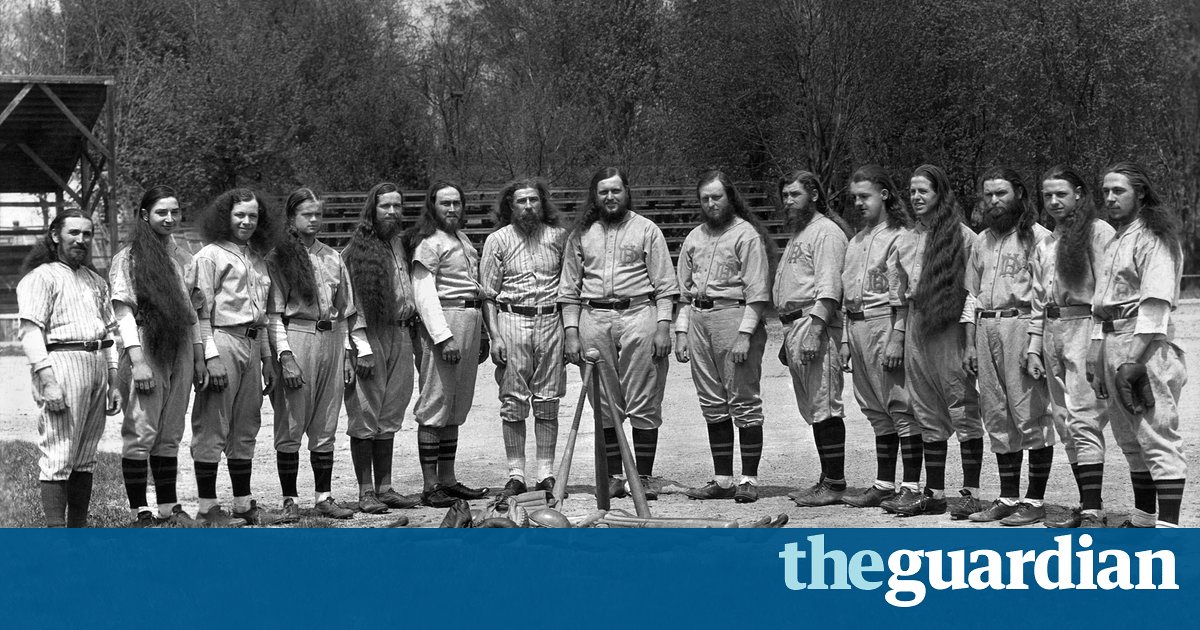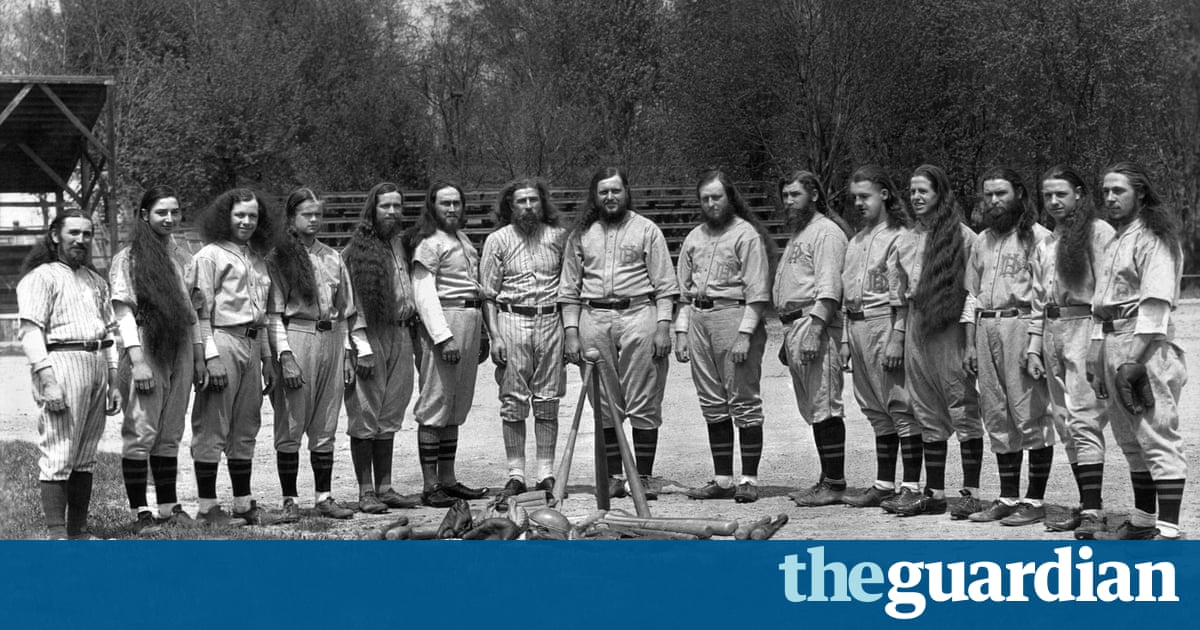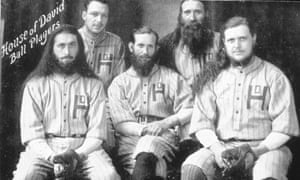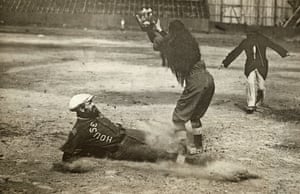The religious sect that became baseball’s answer to the Harlem Globetrotters

The House of David was an Adventist cult that banned alcohol, sex and shaving. But it also loved baseball and its teams toured the country to enraptured crowds

In recent years, extravagant facial hair has become increasingly popular in Major League Baseball. The fad likely began with the 2004 Red Sox, as Johnny Damon and other self-proclaimed idiots wore flowing manes in contrast to the clean-shaven Yankees, who they eventually toppled to win the pennant.
Since then, many players have gained attention for creative beards, with former Giants closer Brian Wilson perhaps the most famous. Yet while these modern exponents are perhaps more recognizable, the art of fine baseball beards can be traced back over a century, to the House of David, a virtuoso team of religious believers that toured the country for almost five decades. Theirs is a compelling tale.
The team represented a religious society co-founded by Benjamin and Mary Purnell in Benton Harbor, Michigan. The Israelite House of David, established by the married couple in March 1903, was an Adventist cult that sought to reunite the 12 tribes of Israel in anticipation of Jesus returning to Earth in the new millennium. Benjamin Purnell considered himself the seventh messenger from the Book of Revelation, and he created the commune as a hub for his work in this field.
With a zeal for preaching, Purnell recruited several hundred members quickly. The society lived a communal existence on a plot that eventually exceeded 1,000 acres. Members relinquished all possessions to Purnell, who outlawed sex, drugs, alcohol, tobacco, meat, and even shaving, in keeping with his staunch brand of millennialism.

The House of David developed a fascinating culture: members harvested fruit and cultivated grain for sustenance. Meanwhile, many trappings of everyday life were shoehorned into the commune, which had its own electricity plant, tailor, carpenter and launder. There was even a small zoo, while lush mansions were built with the shared wealth of their creation. Benton Harbor became a popular tourist destination when Purnell built an amusement park on the grounds. That innovative flame illuminated many aspects of commune life, as women were allowed to vote and hold office years before that was true in wider American society.
Even with amusement rides and ample work factories, boredom could be an issue within the House of David. After all, mandated celibacy excluded one outlet for excess energy. Therefore, Purnell was a big advocate of sports, especially baseball. He believed it taught discipline of the mind, body and soul. Accordingly, a baseball field was built on the property around 1910, and it soon drew impressive crowds to watch pickup games played by House of David members and local semi-professional teams.
In 1914, this raw passion for baseball was channeled into a formal team, named after the commune. Francis Thorpe became the first manager, with Jesse Doc Tally playing a leading role as the first House of David baseball star. The team began playing amateur and semi-professional teams in Michigan, Illinois and Indiana, honing skills and fostering a sense of camaraderie. The House of David entered a league for the first time in 1915, and won the Berrien County Championship in 1916. Their fine play and hirsute appearance earned a mention in the Spalding Guide, while the New York Timesalso ran a feature.
Due to the hyperbolic nature of newspaper reporting at the time, it can be difficult to separate fact from myth regarding the House of David and its baseball history. The team began playing games around the country known as barnstorming in the early 1920s. Amateur and semi-professional teams often provided the opposition, but the House of David also played against the very best squads from the Negro Leagues, a circuit necessitated by Major League segregation.
While the House of David was not the first white team to play against all-black teams, explains Jacob Pomrenke of the Society for American Baseball Research, in many cases their games against, say, the Kansas City Monarchs would have been the first time many fans in America had ever seen white and black faces on the same field. That was important in helping to pave the way for integration in professional baseball with Jackie Robinson later.
With aggressive baserunning, skillful fielding and incredible dexterity at bat, the House of David became baseballs answer to the Harlem Globetrotters. In small towns across America, people flocked to witness their lavish show, typically replete with stunts and gimmicks. The House of David became known for mastering the game of pepper, where players threw and bunted the ball back and forth with great imagination. Crowds were dazzled as the touring players hid balls in their beards and performed tricks aplenty. One obscure scheme saw the House of David play an inning or two with fielders riding donkeys. No ploy was too bizarre.
Yet beneath the glamour, this was also a group defined by athletic talent. The House of David played two or three games per day, riding between diamonds in a bus. They began with a Florida training camp in spring, then crisscrossed the country until fall, often playing over 200 games per season. That some estimate their winning percentage at around .700 is a testament to the skill and fortitude of those selected to play.
At one point, the phenomenon grew so big that the House of David had three different teams touring the country. All revenue generated went back into running the commune in Benton Harbor, while members of the sect distributed religious literature in the packed grandstands at games. In this regard, baseball became a key recruiting tool, and also a prism through which to teach outsiders about the commune.
Similarly, the baseball team became a real campaigning force. It once spent an entire summer touring with the aforementioned Monarchs and insisted on eating and sleeping in the same establishments, contrary to local laws in certain towns. The House of David also had a team for women, which went undefeated in one season, thanks partly to several men playing in disguise.
With this pioneering spirit, the House of David always strove for new ideas, such as playing games under portable lights. The team always claimed that its game on April 17, 1930, in Independence, Kansas, was the first night game ever played, says Pomrenke. The House of David did a lot to popularize the concept of night baseball, and their game in Kansas did take place five years before the first Major League night game, but they were not the first team to play baseball under electric lights.
Nevertheless, the team continued to push the creative envelope. They hired professional players during one era, with Grover Cleveland Alexander joining Satchel Paige and Mordecai Brown as three of the most famous arrivals. Some Major League recruits even wore fake beards to fit in with their team-mates, whose flowing locks were a show of respect to the God of Israel, in keeping with Leviticus 19:27: You shall not round off the hair on your temples or mar the edges of your beard.
Even the great Babe Ruth once posed in a fake beard after meeting some House of David players. Indeed, the team attempted to sign the Great Bambino following his release from the Yankees in 1934. A contract was drawn up, but the team was later advised that Ruths vices would stand in stark contrast to almost everything for which the religious sect stood.
By the time Ruth interacted with the House of David, crisis had ravaged its core. In 1927, Benjamin Purnell stood trial for embezzlement and the sexual assault of young girls in his commune. He was convicted of fraud, but died a few weeks later. His death sent the society spinning towards oblivion, as financial and ethical problems mounted. Several factions formed. Mary Purnell led one group, which moved across the street and became known as the City of David. Meanwhile, a council of elders spearheaded another splinter group which maintained the original name.
This upheaval had profound consequences for the baseball department. Until Purnells death, there had only been one team, says Pomrenke. But beginning in 1930, the original House of David had a team and Mary Purnells City of David colony also had one. This lasted until the mid-1950s, when both teams folded.
Further confusing matters, the original House of David partnered with promoters who formed many different iterations that departed to tour specific areas of the country, all under the same name. Meanwhile, newspapers still often called the City of David by its original name, causing chaos when trying to stitch together the exploits and credit the achievements of each team.

Promoters around the country began capitalizing on this semantic mess. The House of David moniker wasnt copyrighted, and shady businessmen began promoting one-off games involving random teams that briefly adopted the name, which carried a strong allure. However, the Great Depression killed off most of the imitators, in addition to the original House of David team, which ceased existing in 1936. The City of David stopped barnstorming in 1956, ending the sects involvement with baseball.
When Mary Purnell died in 1953, the commune slowly declined, to the point where membership is minuscule to non-existent today. Celibacy and a halted recruitment drive will do that for you, but there has been a major rejuvenation effort in recent years. Museums paying homage to the society and its baseball team have been established, and the Eden Springs amusement park was renovated in 2011.
While those physical monuments are of tremendous value, its the House of David spirit that still inspires awe. Theres often a stigma attached to religious societies, perhaps justly in some instances. But this group, and the baseball team it spawned, should never be forgotten. They blazed a trail in many different areas of life, especially sports, and that contribution provides a legacy to admire.
Read more: https://www.theguardian.com/sport/2016/sep/21/house-of-david-baseball-religious-sect